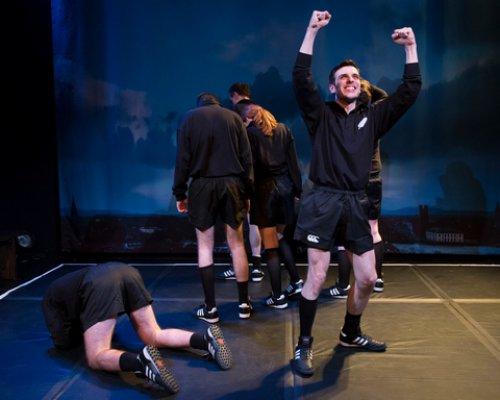Alone It Stands
Writer/director John Breen pays historically slight, if heartfelt, tribute to an improbable Irish victory.

Ed Malone, Henry Raber, David O’Hara, Rob McDermott, Chase Guthrie Knueven and Sarah Street in a scene from John Breen’s “Alone it Stands” (Photo credit: Heidi Bohnenkamp)
When it comes to sports and other public competitions, rooting for the supremely talented is often less emotionally appealing than throwing your support behind whoever, in the grand, objective scheme of things, doesn’t quite deserve a trophy. Why? Well, apart from not wanting to bear witness to the obnoxious achievements of those who are seemingly born to win, there’s also our desperate need to escape life’s soul-crushing predictability while simultaneously obtaining the specious reassurance that if fickle fortune were to choose the underdog this time, then someday it might do us the same solid. Because, in our heart of hearts, we know that genuinely being the best at something is far less likely to happen than just catching a lucky break.
Modest though it may be, even this level of depressed optimism is completely beyond the ken of the Irish characters in John Breen’s Alone It Stands, a panoramic comedy about a glorious day in 1978 when, despite a well-founded collective doubt that it was remotely possible, something good finally happened in Ireland: on a Limerick pitch, near the banks of the River Shannon, a bunch of scrappy undersized Irish lads beat the best rugby team in the world, the New Zealand All Blacks. It’s entirely conceivable that other positive things occurred in Ireland before or since this momentous event, but Breen’s stereotype-filled play owes much to the well-worn notion that the Irish fill their days remembering, living through, and anticipating disappointments.
Breen’s script, a succession of rapid-fire vignettes divided in half by an unnecessary intermission, tries to compensate for its lack of depth with imagined multitudes. According to a promotional flyer, the production’s six actors portray a total of sixty-two characters. While I feel confident enough in my counting abilities to verify the former, I’ll leave the latter to someone whose obsessiveness exceeds my own. That person might also have to be a little generous in regards to defining what constitutes a character.
Still, despite its storytelling shortfalls, the play has its charms, most notably a loopy physicality that occasionally requires the nervy cast (Chase Guthrie Knueven, Ed Malone, Henry Raber, Rob McDermott, David O’Hara, and Sarah Street) to essentially function as a human erector set. Testing both their flexibility and demureness, Breen, who directs Alone It Stands as well, puts his actors’ bodies into configurations that demand not only enviable strength and precise movements but also a level of professional intimacy that goes far beyond what’s normally required in the theater.

Rob McDermott and cast in a scene from John Breen’s “Alone it Stands” (Photo credit: Heidi Bohnenkamp)
As anyone familiar with the sport knows, getting caught up in a rugby scrum isn’t for the faint of heart or the strong of smell, and Breen puts his cast in the middle of several. Against a dusky backdrop depicting the Limerick skyline, he also has them toss each other around on a black gym mat, mimicking the players’ actions from the match that saw the powerful All Blacks bested 12-0 in front of 12,000 gobsmacked fans. Since the game wasn’t televised and the camcorder didn’t exist yet, there is no official or unofficial recording of the Irish team’s monumental achievement, a fact that has only encouraged the event’s mythic reputation and, of course, a flood of dubious claims from anyone alive four decades ago about having seen the Kiwi takedown with their own eyes.
In addition to the players from both teams, some kids more interested in starting a bonfire than attending a rugby match, and the occasional wayward pet, the actors also portray spectators of the completely unexpected trouncing, including a conflicted father-to-be who ends up missing the birth of his twin sons for the honor of witnessing history, a choice for which his wife exacts brilliantly appropriate revenge. Breen’s madcap choreography of the actors’ performances is at its best when the play ludicrously ratchets up the tension by cutting back-and-forth between the action on the pitch and what’s happening in the delivery room.
Paradoxically, both a problem and a strength of the play is that, as Breen’s actors flit between characters, the writer/director is more than willing to sacrifice narrative clarity for visual energy. Especially early on, for example, it’s incredibly difficult to distinguish the New Zealand players from the Irish ones, particularly since the actors’ (uncredited) rugby uniforms/costumes aren’t always reflective of a character’s actual team identity. The only time when we’re sure about who’s who is when the All Blacks line up for the haka, an intimidating ceremonial dance the New Zealanders famously perform before each match. Derived from Māori culture, it’s a fearful wonder to behold, even in this severely scaled-down form, which Michael O’Connor lights with moody intensity. Questions about cultural appropriation, however, like other more serious issues Breen could have addressed, are breezily ignored.
Alone It Stands (through January 27, 2019)
Origin’s First Irish Festival
Gyre and Gimble Productions
59E59 Theaters, 59 East 59th Street, in Manhattan
For tickets, call 212-279-4200 or visit http://www.59e59.org
Running time: one hour and 40 minutes including one intermission






Leave a comment